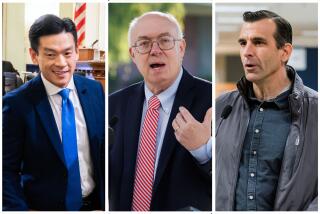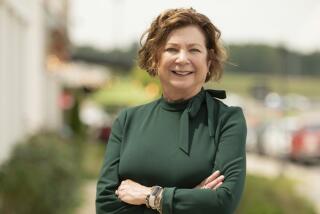Alabama Governor Says He Concedes the Election
- Share via
MONTGOMERY, Ala. — Saying he didn’t want to hurt Alabama, Democratic Gov. Don Siegelman gave up his bid for a second term Monday and conceded the nation’s last undecided governor’s race to Republican Rep. Bob Riley.
Riley, 58, will become just the third Republican governor in Alabama since Reconstruction when he is inaugurated in January. The GOP now holds a 26-24 advantage over Democrats in governorships.
Siegelman, who announced his decision at the state Capitol, said he felt he could have won a recount, but it would have taken months of legal wrangling.
“So for the good of the state of Alabama, for the good of our people, I am dropping my request for a recount,” Siegelman said.
Siegelman and Riley spent months and more than $22 million trading attack ads and, since election day, each had acted as if he was Alabama’s next governor.
The governor called Riley to inform him of his decision.
“The governor was very gracious and offered his support in the transition,” Riley said.
Riley won by 3,117 votes out of 1.3 million cast, or by 0.23 of a percentage point. Siegelman had sought a statewide recount, complaining about the accuracy of the optical scanners used to read ballots.
On election night, Siegelman led in unofficial returns and called on Riley to concede. But Riley jumped in front when officials in Baldwin County, a GOP stronghold, reduced Siegelman’s total by nearly 7,000 votes, saying a computer glitch in their election system had overstated his returns.
Siegelman’s supporters filed petitions in every Alabama county, seeking a recount, including a hand tally in Baldwin County. The move was all but shut down by Republican Atty. Gen. Bill Pryor, who cited a state law that keeps ballots sealed except in limited circumstances.
The Alabama Supreme Court had been considering the legality of a recount when Siegelman reached his decision.
In his announcement, Siegelman said “serious questions” had been raised about the vote returns in Baldwin County. But, the governor said, he decided to avoid “a long, divisive fight.”
Siegelman, 56, ends 20 years in public office that took him from secretary of state to the state’s top office. He was credited with the largest school construction and rural road programs in state history, and for helping bring thousands of new auto industry jobs to Alabama.
But Riley ran on a slogan of “honest change,” hammering the governor over an investigation of his finances and allegations that friends won sweetheart deals from the state.
Riley said his challenge now is to bring Alabama together, with the job done by President Bush after his 500-vote victory in Florida serving as his model.
“If I can reach out to all the people of the state and be half as successful as he’s been, Alabama will be a better place,” Riley said in an interview.
The three-term congressman wears cowboy boots with business suits -- a fitting combination for a man whose resume begins with poultry farmer.
He is a millionaire businessman who also had success in a car dealership and a trucking company before getting elected to Congress.
Riley has spent his entire life in the east Alabama town of Ashland and he exploited his rural roots in his campaign. Commercials showed him walking across his farm and sitting astride his horse in a Ronald Reagan-like pose.
Riley initially wavered on running because one of his daughters was terminally ill with cancer. With her encouragement, he entered the race six weeks before her death in August 2001 and told voters he would be a governor they would be proud of.
He also reached out to traditionally Democratic black voters in an attempt to broaden the GOP. Johnny Ford, a Democratic state lawmaker from Tuskegee, said the congressman worked so hard on behalf of blacks in his district -- including securing $30 million in federal funding for the Tuskegee Airmen Museum -- that he decided to remain neutral in the governor’s race.
Riley jokes that his success in politics and business stems from having to clean out chicken houses as a teenager. “I knew I didn’t want to do that the rest of my life,” he said during the campaign.
More to Read
Sign up for Essential California
The most important California stories and recommendations in your inbox every morning.
You may occasionally receive promotional content from the Los Angeles Times.













